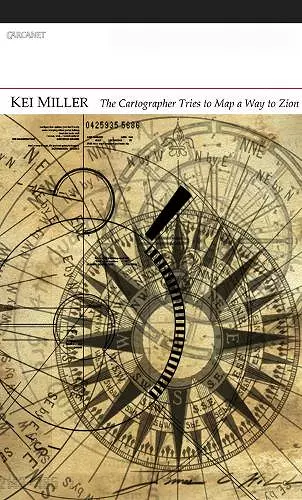The Cartographer Tries to Map a Way to Zion
Format:Paperback
Publisher:Carcanet Press Ltd
Published:30th May '14
Should be back in stock very soon

In his new collection, acclaimed Jamaican poet Kei Miller dramatises what happens when one system of knowledge, one method of understanding place and territory, comes up against another. We watch as the cartographer, used to the scientific methods of assuming control over a place by mapping it (‘I never get involved / with the muddy affairs of land’), is gradually compelled to recognise – even to envy – a wholly different understanding of place, as he tries to map his way to the rastaman’s eternal city of Zion. As the book unfolds the cartographer learns that, on this island of roads that ‘constrict like throats’, every place-name comes freighted with history, and not every place that can be named can be found.
'The verse movement here, the interplay of sound values in inner rhyme and consonantal pairing, in fact the whole lyrical movement of the text, I find exemplary.'
Peter Riley, Fortnightly Review
[Forward Prizes] Jamaican poet Kei Miller was lost for words when he heard that his fourth poetry book, The Cartographer Tries to Map a Way to Zion, had been judged best collection. 'This is bigger than me,' he stammered, before settling down to read with a quiet seriousness that belied his past as national poetry slam champion.
The Cartographer Tries to Map a Way to Zion is a book which, in its ambitions and execution, invites superlatives. Or at leats adjectives, and complimentary ones at that. Sure-footed. Disarming. Lyrical. Subversive. Kei Miller's third collection of poetry is all these things and more than the sum of its parts - not least because he takes two opposing archetypes, namely the rastaman and the colonial cartographer, and transforms what could be a dry, academic take on an enduring historical impasse into a poetry that is truly energized, witty and fresh.
The debate between the titular cartographer and the rastaman takes place within a twenty-seven-part sequence in which the mapmaker's task is, in his own words:'to imagine the widening / of the unfamiliar and also / the widening ache of it; / to anticipate the ironic / question: how did we find / ourselves here?'And in the words of the rastaman, to:'make visible / all them things that shoulda never exist in the first place / like the conquest of pirates, like borders, / like the viral spread of governments...'This call and response sequence is interrupted by thematically related prayers, songs, and a suite of poems that give a sociological and folkloric explanation of 'Place Name' in jamaica, from 'Bloody Bay' and 'Half Way Tree' to 'Flog Man' and 'Edinburgh Castle'. Thus the book's overarching structure is itself more like a map than it is a linear narrative, with jamaica emblematic of the Carribean as a post-colonial, geographic and anthropological entity.
In this sense, the dialogue between the two men is also akin to the reggae sound clash, where DJs from opposing sound systems battle it out for supremacy, each throwing down a tune they hope might outclass the other. The distinctive feature of the soundclash however, is that the DJs not only compete via the music, but also through the configuration of speakers, amps and general ferocity of volume and bass which the specific sound system can deliver. Within this metaphor, the two opposing voices of the cartogrpaher and the rastaman are adversaries not just in terms of content, but also paradigm.
In less skilled hands, the political and philosophical dichotomies these two characters represent might have been rendered polemic. However, Miller sidesteps the pitfalls of an accusatory tone in favour of a mor nuanced approach, where the two men both manage to insinuate their own sphere of influence on the other:'but the mapmaker is slowly getting lost / in de iya ites of de rastaman's talk, for consider when / de rastaman I-nunciates something like: Map / was just a land-guage written against I&I / who never know fi read it...The Cartographer sucks his teeth / and says - every language, even yours, / is a partial map of this world...'
Language and how we use it, manipulate and distort it, in life and literature, is a prominent motif, as is a consideration of the role of the poetry and the poet. Miller shifts effortlessly between standard UK English and a hybridized Jamaican vernacular, where, having begun the 'DUP-DUP-dudududu-DUP-DUP' of a ceremonial, 'nyabinghi beat, the rastaman exclaims 'Ain't nutt'n iambic bout dis'. As such this is a collection that consolidates Miller's technical expertise and innate musicality with a knack for rhetoric, and one that makes light work of what Jamaicans call 'hard fo
- Winner of Forward Prize for Best Collection 2014
- Short-listed for International Dylan Thomas Prize 2014
- Short-listed for Costa Poetry Award 2014
ISBN: 9781847772671
Dimensions: 216mm x 132mm x 8mm
Weight: unknown
72 pages